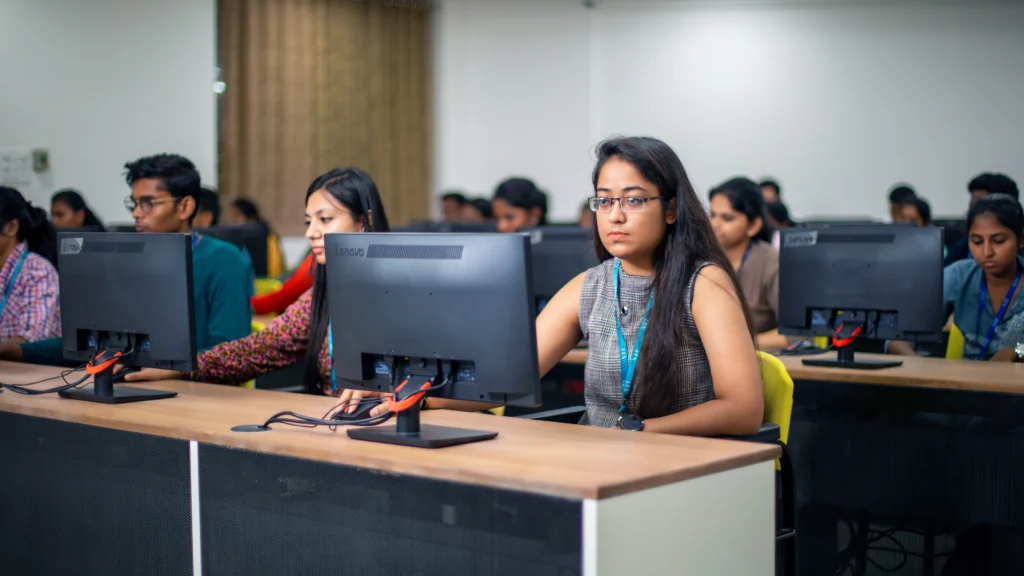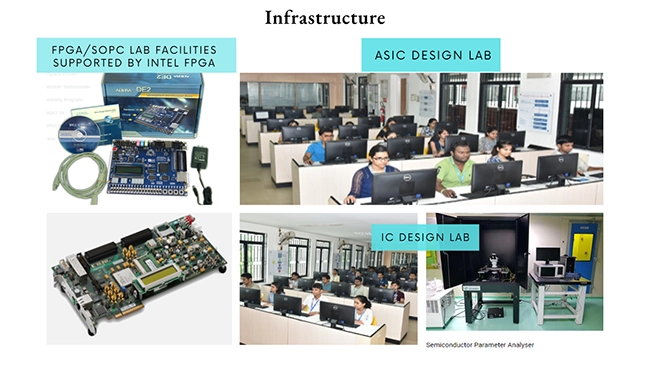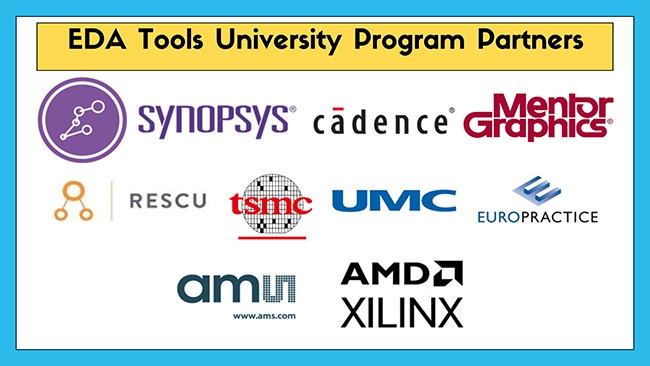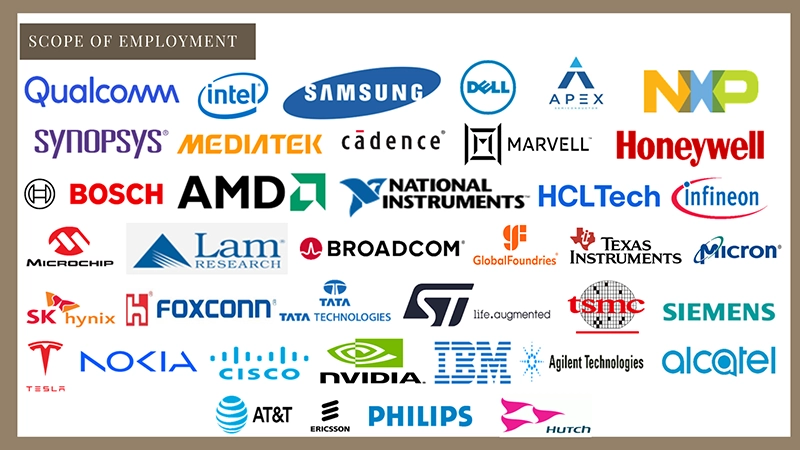School of Electronics Engineering (SENSE) - UG
School of Electronics Engineering (SENSE)
The School offers Bachelor’s programme in Electronics and Communication Engineering, Electronics and Computer Engineering, and Electronics Engineering ( VLSI Design and Technology).
The B.Tech. Electronics and Communication Engineering courses are accredited by the Engineering Accreditation Commission of ABET (http://www.abet.org ).

1. B.Tech. Electronics and Communication Engineering
2. B.Tech. Electronics and Computer Engineering
3. B.Tech. Electronics Engineering (VLSI Design and Technology)
Programmes Offered in Chennai Campus
1. B.Tech. Electronics and Communication Engineering
2. B.Tech. Electronics and Computer Engineering
3. B.Tech. Electronics Engineering (VLSI Design and Technology)
- B.Tech Electronics Engineering ( VLSI Design and Technology)
- About the Programme
- Programme Core Courses
- Programme Elective Courses
- Infrastructure
- Scope of employment
- Curriculum
This core electronics program provides in-depth knowledge and hands-on expertise in Very Large Scale Integration (VLSI) and semiconductor chip design, preparing students for advanced careers in the electronics industry. Through transformative education and impactful research, this program prepares students to become innovative, industry-ready leaders who will shape a vibrant semiconductor eco-system and contribute to India’s rise as a global center for electronics design and manufacturing. Further, this program is initiated with an aim to support ISM (India Semiconductor Mission), Government of India.
Key Highlights
- Industry Standard Electronic Design Automation Tools
- Industry Academia Collaboration
- State of the art research centers and smart learning facilities
- Academic Experts having strong conceptual background and industry exposure
Net work Theory /Electronic Devices/Digital System Design/Engineering Electromagnetics/ Microcontroller and Embedded C Programming/Control Systems/Electronic Circuits/ Computer Architecture/ Communication Systems/Signal Processing/VLSI System Design/ ASIC Design / CMOS Analog IC Design/ Verification Methodologies/ VLSI Technology/VLSI Testing and Testability, CAD for VLSI Design
2D Materials and Devices / Compound Semiconductors /Quantum Technology for Electronics Engineers / Thin Films Characterization/ Photovoltaics and Energy Conversion Devices / Memory Devices and circuits /Low Power VLSI Design / Testing of VLSI Circuits / Embedded System Design with FPGA /VLSI Architectures for DSP/ Advanced Computer Architecture/Computational Techniques/ Mixed Signal Circuit Design/ CMOS RF IC Design/ Electronics Packaging/ AI and Machine Learning for IC/ Neuromorphic Computing/ Design of CMOS Phase Locked Loop/ Hardware Security/ High Speed Interconnects for VLSI Design /Stacked IC Design /Verification Methodologies / Advanced Semiconductor Devices/ IC Packaging and Testing / Hardware Accelerators for AI and ML
- IC Design Lab and ASIC Design Lab is fully equipped with industry standard EDA Tools with 60 user licenses for Synopsys IC Bundle, Siemens EDA and EDA Tools from Cadence. Students and Researchers can have hands on experience in both Analog and Digital IC design starting from front end to GDSII.
- FPGA/SOPC Lab is equipped with the ALTERA Design Suite, Xilinx Programmable Logic Design Tools, Cypress Semiconductor Microsystems software with 60 user licenses. It is also equipped with the following hardware boards: Cyclone DE1 and DE2 Boards from Altera, Stratix DE3 Board from Altera, Virtex and Spartan Boards from Xilinx and Semiconductor programmable SoC Kits from Cypress for prototyping.


- Companies which hire them: Qualcomm, Intel, Samsung, Dell, Apex Semiconductors, NXP Semiconductors, MediaTek, Cadence, Synopsys, MARVELL, MicroChip, TI, ST Microelectronics, NVIDIA, AMD, Infineon, Global Foundries.
- In 2022, the Indian semiconductor market was valued at US$ 26.3 billion and is projected to expand at a CAGR of 26.3% to US$ 271.9 billion by 2032.
- India is poised to witness exponential growth in its semiconductor industry and received
US$ 21 billion value of proposals from various international companies on 2025.

- B.Tech. Electronics and Communication Engineering
- About the Programme
- Programme Core Courses
- Programme Elective Courses
- Infrastructure
- Scope of employment
- Curriculum
The programme impart in-depth knowledge of communication engineering theory and practice sessions by exposing them to various fields like Digital & Wireless communications, Wireless networks, Optical communications, Microwave circuits and signal processing. In this programme undergraduates will gain invaluable hands-on practical experience under the mentorship of faculty of their choice and prepares undergraduates for postgraduate research studies and Industry in versatile fields of Electronics and communication domain.
Fundamentals of Electric Circuits / Semiconductor Devices and Circuits / Network Theory / Signals and systems / Probability Theory and Random Process/ Analog Electronic Circuits / Digital Logic Design/ Engineering Electromagnetic / Digital Signal Processing / Microcontroller and Applications / Antennas and Wave Propagation / Digital Communication / Information Theory and Coding / Computer Communication / Optical Communication and Networks/ Microwave Engineering / VLSI System Design / Wireless and Mobile Communication / Control Systems / Transmission Lines and Fields / Workshop Practice / Engineering Graphics/Material Science / Differential and Difference Equations /Complex Variables and Partial Differential Equations.
Data Structures and Algorithms/ Computer Organization and Architecture / Digital Image Processing / Bio-medical Instrumentation and Analysis / Satellite Communication/ Embedded System Design / Radar and Navigational Aids / Introduction to Nanoscience & Nanotechnology / Neural Networks & Fuzzy Control / Digital System Design / Micro and Smart Systems Technology / Wireless Sensor Networks / Advanced Microcontrollers (ARM,DSP) / Opto Electronics / Applied Numerical Methods.
- Analog System Design Laboratory is well equipped with sophisticated equipments to perform experiments on diode based electronic circuit design and transistor based electronic circuit designs. The available equipments in this lab are CRO’s, Function Generators, Power supplies, Digital Ammeters, Digital Voltmeters, Analog Ammeters and Analog Voltmeters. This lab also has 18 Zealtech workbenches which enables the students to perform the experiments in team.
- Digital Electronics Laboratory is well equipped with various digital ICs and equipments like latest model Digital IC trainer Kits, Logic Analyser, DSOs, Function Generators, Pulse Generators, Power Supplies, Digital Multimeters for performing Digital Logic Design experiments and projects.
- Communication Engineering Laboratory is equipped with hardware equipments to carry out analog, digital and wireless communication experiments. The hardware equipments include, Digital storage oscilloscope (60 MHz and 200 MHz), EXA Signal Analyzer, RF Signal Generator, Mixed Signal Oscilloscope, Arbitrary Waveform Generator, Multipurpose lab station, Digital IQ Modulation Set, Multiple output power supply, Wireless Software Defined Radio (900 MHz and 2.4 GHz), Sensor Module from Sensenut (Radio Module with Integrated Antenna, Gateway Module with USB cable, Gateway Module Wireless, TL Sensor Module (Temp. & Light), HTP Sensor Module (Humidity, Temp & Pressure), GAP Sensor Module (GPS, PIR & Accelerometer)). The software module includes, NetSim Version 9.1, Multisim ver. 10, Matlab 2015, broadband wireless simulator.
- Microwave Laboratory is equipped with X-Band waveguide test bench setup, Gunn diode test bench setup, antenna system trainer kit, S-Band MIC trainer kit, S-18 Transmission Line Trainer kit, RF Signal generator (9KHz-3GHz), AWR Microwave Office, CST Microwave Studio, ADS (Advanced Design System) and HFSS. This lab carries out the design and analysis of microwave circuits and components, antenna design for wireless application, design of filters, phase shifter and smart antennas for different space application and defense application.
- Digital Signal Processing and Advanced Digital Signal Processing Laboratory is equipped with TEXAS TMS320C6748 development kit, Image daughter card, Digital media developer kit, CC studio IDE, MATLAB, Video capture frame grabber, Real time image processing software.
- Optical Communication Laboratory is equipped with Fiber Optic Communication Bench Top with WDM Technology Light runner Kit, OTDR set up, Free Space Optic set up, OPTSIM, OPTISYSTEM.
- Networking Laboratory is equipped with NETSIM Academic Simulator with 60 User licenses and research license, Qualnet Simulator with 30 user licenses and research license, Riverbed Modeler Academic Version, Dell PowerEdge 7 Series server and 62 State of art computing machines, Asus and Netgear Layer2 & Layer3 Switches, Wireless Router and Ethernet cards.
- Microprocessor and Microcontroller Laboratory is equipped with ARM based NXP Microcontroller, 8051 based NXP Microcontroller, various interfacing devices, Embedded developments boards, Keil software [supports ARM microprocessors and microcontrollers, 8051 microcontrollers] and Proteus software [simulates 8051 microcontrollers based system].
- FPGA/SOPC Laboratory is equipped with the ALTERA Design Suite, Xilinx Programmable Logic Design Tools, Cypress Semiconductor Microsystems software with 60 user licenses. It is also equipped with the following hardware boards Cyclone DE1 and DE2 Boards from Altera, Stratix DE3 Board from Altera, Virtex and Spartan Boards from Xilinx and Semiconductor programmable SoC Kits from Cypress for prototyping.
- Industries involving Wireless Communications and Signal Processing, Micro / Nanoelectronics, Lasers and Optics, Electronic Devices, Telecommunications, Nanotechnology, Robotics, Information Systems, Power Systems, Computer Software- Hardware Integration, Control Systems, and other Advanced Technologies.
- Placement in leading core communication companies like BSNL, MTNL, Reliance Communications, Tata Telecomm, Hutch, Bharti Telecom, Airtel, Nokia, CISCO, IBM, Intel, Agilent, Alcatel, AT&T, Ericsson, Honeywell, Bosch, National Instruments, IBM, Texas Instruments, HCL and others.
- B.Tech. Electronics and Computer Engineering
- B.Tech - Electronics and Communication Engineering (Biomedical Engineering) (Programme withdrawn in 2026)
- About the Programme
- Programme Core Courses
- Programme Elective Courses
- Infrastructure
- Scope of employment
- Curriculum
Electronics and Communication Engineering with specialization in Biomedical Engineering is an interdisciplinary programme that combines Electronics Engineering with biology to solve medical problems in living systems. The course aims at enabling the students to acquire technical skills for becoming experts in designing Electronics Circuits, Embedded Systems, Biomedical Instrumentation, Biomaterials and Biomechanics. The programme aims to equip students with skills to develop new technologies like Artificial Intelligence and Machine Learning, Robotics and Automation, MEMS and Virtual Instrumentation. The strong collaborative connection with academia, industry and clinical research offers a prospective environment for professional development and experience in the related fields.
Biochemical Analysis and Techniques/Materials for Organs and Devices/Tissue Engineering/ Biomechanics and Fluid Dynamics/Bioinformatics/Biometric Technology and Security Systems/Telemedicine and Virtual Instrumentation/Probability and Statistical Theory of Communication/EMC and EMI/Antenna and Microwave Engineering/Biomedical Imaging/Wearable Technology/Lab on-chip/Robotics and Automation/Artificial Intelligence for Biomedical/Data Mining/ Nano Medicine/Regenerative Medicine/Hospital Management/VLSI System Design/Medical Informatics/Chemical and Bio-sensors/Optical Communication and Networks/Information Theory and Coding/Wireless and Mobile Communication/Embedded Programming/M2M Communication/Applied Numerical Methods/Web Technologies/Data Base Management Systems
Fundamentals of Mathematics (Bridge Course)/Life Sciences for Biomedical Engineers (Bridge Course)/Basic Electrical and Electronics Engineering/Analog Circuits/ Sensors and Transducers for Health Care/Digital Circuit Design/Applications of Differential and Difference Equations/Data Structures and Algorithms/Signals and Systems /Applied Linear Algebra/Electromagnetic Field Theory and Transmission Lines/ Biomedical Instrumentation and Measurements/Physiological Signal Processing/ Control Systems/Data Acquisition Techniques/Digital Image Processing for Medical Applications/Medical Device Technology/Principles of Communication Engineering/ Principles of Computer Communication/Microcontroller and Embedded Systems/ Physiological System Modelling.
- Communication Engineering Laboratory is equipped with hardware equipments to carry out analog, digital and wireless communication experiments. The hardware equipments includes, Digital storage oscilloscope (60 MHz and 200 MHz), EXA Signal Analyzer, RF Signal Generator, Mixed Signal Oscilloscope, Arbitrary Waveform Generator, Multipurpose lab station, Digital IQ Modulation Set, Multiple output power supply, Wireless Software Defined Radio (900 MHz and 2.4 GHz), Sensor Module from Sensenut (Radio Module with Integrated Antenna, Gateway Module with USB cable, Gateway Module Wireless, TL Sensor Module (Temp. & Light), HTP Sensor Module (Humidity, Temp & Pressure), GAP Sensor Module (GPS, PIR & Accelerometer)). The software module includes, NetSim Version 9.1, Multisim ver. 10, Matlab 2015, broadband wireless simulator.
- Networking Lab is equipped with NETSIM Academic Simulator with 60 User licenses and research license, Qualnet Simulator with 30 user licenses and research license, Riverbed Modeler Academic Version, Dell PowerEdge 7 Series server and 62 State of art computing machines, Asus and Netgear Layer2 & Layer3 Switches, Wireless Router and Ethernet cards.
- Microprocessor and Microcontroller Lab is equipped with ARM based NXP Microcontroller, 8051 based NXP Microcontroller, various interfacing devices, Embedded developments boards, Keil software [supports ARM microprocessors and microcontrollers, 8051 microcontrollers] and Proteus software[simulates 8051 microcontrollers based system].
- Advanced Micro Controller and RTOS Lab is equipped with KEIL Simulator Tool, Linux, VxWorks RTOS, AppCOE Simulator, Xilinx Vivado Design Suite and NI Labview. Associated hardware are MBED NXP LPC1768, ARM 9 and ARM Cortex boards, Xilinx FPGA Boards: Zybo ZYNQ 7000 ARM/FPGA SoC Trainer Board, Nexys 4 Artix-7 FPGA Trainer Boards and interfacing peripherals, Zed Board Zynq-7000 ARM/FPGA SoC Development Board, NetFPGA-1G-CML, Xilinx Kintex-7 netFPGA Development Board, Black fin processor, CAN controllers, TELOSB, ULK kit, NVIDIA GPU TESLA K40 and GTX 780. Lab is housed with 65 State of art computing machines with Windows 2000 server and HP Workstations Z440 & Z640.
- Data Acquisition Laboratory is equipped with NI LabVIEW 2015 software, Analog I/O, Digital I/O, NIELVIS, MyDAQ, cDAQ, cRIO, Quanser control modules, NI WSN modules, Rasberry pi and ARM boards.
- Sensor Systems Laboratory is equipped with different Physical Sensors, Agilent Digital Storage Oscilloscope, Infrared Camera, Hot wire anemometer, Agilent Lab station, Pico ammeter and Arbitrary waveform generator.
- Chemical Sensor Laboratory is equipped with Sputtering unit, Hydraulized motor press, Laser Engraver, Chemical wet etch bench, Flat screen printer with vacuum worktable, LCR meter, Source IV meter, Furnace, Ultrasonic cleaner, Optical microscope, Digital balance, Gas sensing setup.
- MEMS Design Laboratory is equipped with Comsol Multiphysics 5.3a, Intellisuite 8.9v, Conventorware suite 10.1v.
- Anatomy & Physiology Laboratory is equipped with human skeleton, individual bones, sphygmomanometer, stethoscope, clinical ECG monitor, ABO blood group starter kit, ESR and Hemoglobin meters, Harris mat, fibre optic organ models of brain, ear, eye, heart and lung.
- Biomedical Instrumentation Laboratory is equipped with Electrocardiography system, Electromyography system, ECG Telemetry system, Electroencephalography system, Phono-cardiography, Cobe centry-Hemodialysis equipment, Electrocare-Ventilator, Maquet-Heart Lung machine, X-ray machine, Shortwave Diathermy, Surgical Diathermy and Audiometer, Pacemaker, Defibrillator, Phonocardiography, Echo transducer, Sphygmomanometer and Electromyography.
- Biosignal Processing Laboratory is equipped with MATLAB software
- Biomedical Image Processing Laboratory is equipped with Philips Ultrasound machine and MATLAB software.
- Biochemistry laboratory is equipped with Auto analyser, Colorimeter, Flame photometer, Centrifuge Water bath.
- The U.S. Bureau of Labour Statistics predicts biomedical engineers to have employment growth of 72% over the next few years.
- Electronics Engineers in industry and R&D institutions.
- Design Engineers and Scientists in health care research institutes.
- Embedded Systems Designer in medical devices manufacturing industry.
- Healthcare research analysts/consultants.
- Entrepreneurs in the ever- developing medical services industry.
- B.Tech. Electronics and Communication Engineering with specialisation in Sensors and Wearable Technology (Programme withdrawn in 2019)
- About the Programme
- Programme Core Courses
- Programme Elective Courses
- Infrastructure
- Scope of employment
- Curriculum
Electronics and Communication Engineering with specialization in Sensors and Wearable Technology is a unique undergraduate course based on the prediction of industry needs in the near future. Sensors and Wearable technology is a inter-disciplinary program which includes cluster of technologies. The program aims to equip students with the basics of Electronics and Communication Engineering and also skills to develop new technologies for designing new wearable systems, data processing and analytics, deep learning, peer to peer communication and Internet of Things. Elective courses also helps the students to acquire technical knowledge for becoming experts in electronics, embedded systems, VLSI design, Wireless sensor networks, MEMS and NEMS.
Basic Electrical and Electronics Engineering/Analog Circuits/Basics of Sensors and Wearable Technology/Data Structures and Algorithms/Digital Circuit Design/Applications of Differential and Difference Equations/Electromagnetic Field Theory and Transmission Lines/Sensor Technology for Wearable Applications/Biomedical Instrumentation and Measurements/Signal Analysis and Processing/Applied Linear Algebra/Control Systems/Communication System Design /Data Acquisition Techniques/Principles of Communication Engineering/Wearable Technology and IoT/Principles of Computer Communication/Microcontroller and Embedded Systems/Wireless Sensor Networks and IoT/Data Analytics for Wearable Technology
Machine Learning and AI/Data Analytics using R Programming /Materials for Organs and Devices /Artificial Intelligence for Biomedical /Lab on-chip /Tissue Engineering / Data Mining/IoT Edge Nodes and its Applications/Mobile App Development for IoT/Fiber Optic Sensors and applications/Probability and Statistical Theory of Communication/EMC and EMI/VLSI System Design/Antenna and Wave Propagation/Microwave Engineering/RFID and Flexible Sensors/Sensors for Structural Health Monitoring/Wireless Sensor Networks and IoT/MEMS and Nano Sensors/Chemical and Bio-sensors/Wireless and Mobile Communication/Embedded Programming/M2M Communication/Embedded Sensing Technologies/Applied Numerical Methods/Web Technologies/Geographical Information System
- Communication Engineering Laboratory is equipped with hardware equipments to carry out analog, digital and wireless communication experiments. The hardware equipments includes, Digital storage oscilloscope (60 MHz and 200 MHz), EXA Signal Analyzer, RF Signal Generator, Mixed Signal Oscilloscope, Arbitrary Waveform Generator, Multipurpose lab station, Digital IQ Modulation Set, Multiple output power supply, Wireless Software Defined Radio (900 MHz and 2.4 GHz), Sensor Module from Sensenut (Radio Module with Integrated Antenna, Gateway Module with USB cable, Gateway Module Wireless, TL Sensor Module (Temp. & Light), HTP Sensor Module (Humidity, Temp & Pressure), GAP Sensor Module (GPS, PIR & Accelerometer)). The software module includes, NetSim Version 9.1, Multisim ver. 10, Matlab 2015, broadband wireless simulator.
- Networking Lab is equipped with NETSIM Academic Simulator with 60 User licenses and research license, Qualnet Simulator with 30 user licenses and research license, Riverbed Modeler Academic Version, Dell PowerEdge 7 Series server and 62 State of art computing machines, Asus and Netgear Layer2 & Layer3 Switches, Wireless Router and Ethernet cards.
- Microprocessor and Microcontroller Lab is equipped with ARM based NXP Microcontroller, 8051 based NXP Microcontroller, various interfacing devices, Embedded developments boards, Keil software [supports ARM microprocessors and microcontrollers, 8051 microcontrollers] and Proteus software[simulates 8051 microcontrollers based system].
- Advanced Micro Controller and RTOS Lab is equipped with KEIL Simulator Tool, Linux, VxWorks RTOS, AppCOE Simulator, Xilinx Vivado Design Suite and NI Labview. Associated hardware are MBED NXP LPC1768, ARM 9 and ARM Cortex boards, Xilinx FPGA Boards: Zybo ZYNQ 7000 ARM/FPGA SoC Trainer Board, Nexys 4 Artix-7 FPGA Trainer Boards and interfacing peripherals, Zed Board Zynq-7000 ARM/FPGA SoC Development Board, NetFPGA-1G-CML, Xilinx Kintex-7 netFPGA Development Board, Black fin processor, CAN controllers, TELOSB, ULK kit, NVIDIA GPU TESLA K40 and GTX 780. Lab is housed with 65 State of art computing machines with Windows 2000 server and HP Workstations Z440 & Z640.
- Data Acquisition Laboratory is equipped with NI LabVIEW 2015 software, Analog I/O, Digital I/O, NIELVIS, MyDAQ, cDAQ, cRIO, Quanser control modules, NI WSN modules, Rasberry pi and ARM boards.
- Sensor Systems Laboratory is equipped with different Physical Sensors, Agilent Digital Storage Oscilloscope, Infrared Camera, Hot wire anemometer, Agilent Lab station, Pico ammeter and Arbitrary waveform generator.
- Chemical Sensor Laboratory is equipped with Sputtering unit, Hydraulized motor press, Laser Engraver, Chemical wet etch bench, Flat screen printer with vacuum worktable, LCR meter, Source IV meter, Furnace, Ultrasonic cleaner, Optical microscope, Digital balance, Gas sensing setup.
- MEMS Design Laboratory is equipped with Comsol Multiphysics 5.3a, Intellisuite 8.9v, Conventorware suite 10.1v.
- Anatomy & Physiology Laboratory is equipped with human skeleton, individual bones, sphygmomanometer, stethoscope, clinical ECG monitor, ABO blood group starter kit, ESR and Hemoglobin meters, Harris mat, fibre optic organ models of brain, ear, eye, heart and lung.
- Biomedical Instrumentation Laboratory is equipped with Electrocardiography system, Electromyography system, ECG Telemetry system, Electroencephalography system, Phono-cardiography, Cobe centry-Hemodialysis equipment, Electrocare-Ventilator, Maquet-Heart Lung machine, X-ray machine, Shortwave Diathermy, Surgical Diathermy and Audiometer, Pacemaker, Defibrillator, Phonocardiography, Echo transducer, Sphygmomanometer and Electromyography.
- Biosignal Processing Laboratory is equipped with MATLAB software
- Biomedical Image Processing Laboratory is equipped with Philips Ultrasound machine and MATLAB software.
- Biochemistry laboratory is equipped with Auto analyser, Colorimeter, Flame photometer, Centrifuge Water bath.
- The strong collaborative connection with academia, industry and national research organizations offer a prospective environment for professional development and expertise in the field.
- B.Tech. Electronics and Communication Engineering with specialisation in IoT and Sensors (Programme withdrawn in 2019)
- About the Programme
- Programme Core Courses
- Programme Elective Courses
- Infrastructure
- Scope of employment
- Curriculum
B.Tech. Electronics and Communication Engineering with Specialization in Internet of Things and Sensors is an interdisciplinary programme that combines the study of electronic engineering, with an emphasis on computer science, internet technologies, wireless communications, sensor devices, and cloud computing. This programme aims to equip the students with a broader knowledge and practical skills on electronics engineering with computer technology and sensor networks that provides a wide range of applications in the Internet of Things. The programme will start with a strong foundation of mathematics in and continues with a basic theory of Electronics and Computer Technology, core modules in Electronics, Computers and Communication Networks will be emphasized.
Data Structures and Algorithms / Cloud Computing and Information Security / Applications of Differential and Difference Equations / Applied Linear Algebra / Basic Electrical and Electronics Engineering / Electronic Circuits / Electromagnetic Field Theory and Transmission Lines / Signal Analysis and Processing / Control Systems / Principles of Sensors and Data Acquisition / Principles of Communication Engineering / Digital Circuit Design / IoT System Architecture / Graphical System Design for Communication Engineers / Principles of Computer Communication / Microcontroller and Embedded Systems / Sensor Technology
Data Mining / IoT Edge Nodes and its Applications / Mobile App Development for IoT / Fiber Optic Sensors and Applications / Probability and Statistical Theory of Communication / EMC and EMI / VLSI System Design / Antennas and Wave Propagation / Microwave Engineering / IoT in Automotive Systems / IoT for Industrial Systems / RFID and Flexible Sensors / Sensors for Structural Health Monitoring / Wireless Sensor Networks and IoT / MEMS and Nano Sensors / Chemical and Bio-sensors / Wireless Technologies for IOT / Advanced Microcontrollers / Optical Communication and Networks / Information Theory and Coding / Wireless and Mobile Communication / Embedded Programming / M2M Communication / Embedded Sensing Technologies / Smart IoT Applications / Web Technologies / Geographical Information System / Applied Numerical Methods / Cyber Physical Systems / Data Analytics
- Communication Engineering Laboratory is equipped with hardware equipment’s to carry out analog, digital and wireless communication experiments. The hardware equipment’s includes, Digital storage oscilloscope (60 MHz and 200 MHz), EXA Signal Analyzer, RF Signal Generator, Mixed Signal Oscilloscope, Arbitrary Waveform Generator, Multipurpose lab station, Digital IQ Modulation Set, Multiple output power supply, Wireless Software Defined Radio (900 MHz and 2.4 GHz), Sensor Module from Sensenut (Radio Module with Integrated Antenna, Gateway Module with USB cable, Gateway Module Wireless, TL Sensor Module (Temp. & Light), HTP Sensor Module (Humidity, Temp & Pressure), GAP Sensor Module (GPS, PIR & Accelerometer)). The software module includes, NetSim Version 9.1, Multisim ver. 10, Matlab 2015, broadband wireless simulator.
- Networking Lab is equipped with NETSIM Academic Simulator with 60 User licenses and research license, Qualnet Simulator with 30 user licenses and research license, Riverbed Modeler Academic Version, Dell PowerEdge 7 Series server and 62 State of art computing machines, Asus and Netgear Layer2 & Layer3 Switches, Wireless Router and Ethernet cards.
- Microprocessor and Microcontroller Lab is equipped with ARM based NXP Microcontroller, 8051 based NXP Microcontroller, various interfacing devices, Embedded developments boards, Keil software [supports ARM microprocessors and microcontrollers, 8051 microcontrollers] and Proteus software[simulates 8051 microcontrollers based system].
- Advanced Micro Controller and RTOS Lab is equipped with KEIL Simulator Tool, Linux, VxWorks RTOS, AppCOE Simulator, Xilinx Vivado Design Suite and NI Labview. Associated hardware are MBED NXP LPC1768, ARM 9 and ARM Cortex boards, Xilinx FPGA Boards: Zybo ZYNQ 7000 ARM/FPGA SoC Trainer Board, Nexys 4 Artix-7 FPGA Trainer Boards and interfacing peripherals, Zed Board Zynq-7000 ARM/FPGA SoC Development Board, NetFPGA-1G-CML, Xilinx Kintex-7 netFPGA Development Board, Black fin processor, CAN controllers, TELOSB, ULK kit, NVIDIA GPU TESLA K40 and GTX 780. Lab is housed with 65 State of art computing machines with Windows 2000 server and HP Workstations Z440 & Z640.
- Data Acquisition Laboratory is equipped with NI LabVIEW 2015 software, Analog I/O, Digital I/O, NIELVIS, MyDAQ, cDAQ, cRIO, Quanser control modules, NI WSN modules, Rasberry pi and ARM boards.
- Sensor Systems Laboratory is equipped with different Physical Sensors, Agilent Digital Storage Oscilloscope, Infrared Camera, Hot wire anemometer, Agilent Lab station, Pico ammeter and Arbitrary waveform generator.
- Chemical Sensor Laboratory is equipped with Sputtering unit, Hydraulized motor press, Laser Engraver, Chemical wet etch bench, Flat screen printer with vacuum worktable, LCR meter, Source IV meter, Furnace, Ultrasonic cleaner, Optical microscope, Digital balance, Gas sensing setup.
- MEMS Design Laboratory is equipped with Comsol Multiphysics 5.2a, Intellisuite 8.9v, Conventorware suite 10.1v.
- The number of connected IoT (Internet of Things) devices, sensors and actuators will reach over 46 billion in 2021. The Global Internet of Things (IoT) market reached USD 598.2 Billion in 2015 and the market is expected to reach USD 724.2 Billion by 2023. Further, the market is projected to register a CAGR of 13.2% during the forecast period 2016-2023 globally. Employment, Research and Start up opportunities are inclined in line with the market projection. Futuristic IoT jobs are Agricultural Technologist, 3-D Printing Engineer, Wearable Tech Designer, Medical Robot Designer, Data Security Expert, Cloud Computing Specialist, E-discovery Investigator, Intermodal Transport Designers, Counter Hackers, and many more.
- B.Tech. Electronics and Computer Engineering - VIT Chennai
- B.Tech. Biomedical Engineering (Programme withdrawn in 2018)
- About the Programme
- Programme Core Courses
- Programme Elective Courses
- Infrastructure
- Scope of employment
- Curriculum
Biomedical engineering is an interdisciplinary program that combines engineering with biology to solve medical problems in living systems. The program aims to equip students with skills to develop new technologies for life saving equipment, biomedical instruments for treatment and diagnosis, physiological parameter monitoring using sensors, biomechanics, biomedical imaging, medical devices, cell and tissue engineering and more other medical applications. The course also aims at enabling the students to acquire technical skills for becoming experts in telemedicine, healthcare communication and medical informatics. The strong collaborative connection with academia, clinical medicine and industry offers opportunities for the professional development and to gain unique knowledge and experience in the field.
Human Anatomy and Physiology / Fundamentals of Electric and Magnetic Circuits / Semiconductor devices and circuits / Integrated Circuits / Digital Electronics / Medical Physics and Biomedical Instrumentation / Signals and Systems / Diagnostic and Therapeutic Equipment / Digital Signal Processing / Microcontrollers and its applications / Sensors and Measurements / Control Systems Engineering / Analog and Digital Communication / Image Processing / Industry Internship / Project Work.
Biochemical analysis and techniques / Biomaterials & Artificial Organs / Biofluid Dynamics /Biomechanics / Data Base Management Systems / Data Structures and Algorithm / Physiological System Modeling / Neural Networks & Fuzzy Control / Biometric Systems / Medical Informatics / Bio-Signal Processing / BioMEMS & Systems on-chip / Telemedicine / Medical Imaging Equipment / Embedded Systems in Medical Applications / Medical Optics / Hospital Management / Graphical System Design for Biomedical Engineers.
- Communication Engineering Laboratory is equipped with hardware equipment’s to carry out analog, digital and wireless communication experiments. The hardware equipment’s includes, Digital storage oscilloscope (60 MHz and 200 MHz), EXA Signal Analyzer, RF Signal Generator, Mixed Signal Oscilloscope, Arbitrary Waveform Generator, Multipurpose lab station, Digital IQ Modulation Set, Multiple output power supply, Wireless Software Defined Radio (900 MHz and 2.4 GHz), Sensor Module from Sensenut (Radio Module with Integrated Antenna, Gateway Module with USB cable, Gateway Module Wireless, TL Sensor Module (Temp. & Light), HTP Sensor Module (Humidity, Temp & Pressure), GAP Sensor Module (GPS, PIR & Accelerometer)). The software module includes, NetSim Version 9.1, Multisim ver. 10, Matlab 2015, broadband wireless simulator.
- Networking Lab is equipped with NETSIM Academic Simulator with 60 User licenses and research license, Qualnet Simulator with 30 user licenses and research license, Riverbed Modeler Academic Version, Dell PowerEdge 7 Series server and 62 State of art computing machines, Asus and Netgear Layer2 & Layer3 Switches, Wireless Router and Ethernet cards.
- Microprocessor and Microcontroller Lab is equipped with ARM based NXP Microcontroller, 8051 based NXP Microcontroller, various interfacing devices, Embedded developments boards, Keil software [supports ARM microprocessors and microcontrollers, 8051 microcontrollers] and Proteus software[simulates 8051 microcontrollers based system].
- Advanced Micro Controller and RTOS Lab is equipped with KEIL Simulator Tool, Linux, VxWorks RTOS, AppCOE Simulator, Xilinx Vivado Design Suite and NI Labview. Associated hardware are MBED NXP LPC1768, ARM 9 and ARM Cortex boards, Xilinx FPGA Boards: Zybo ZYNQ 7000 ARM/FPGA SoC Trainer Board, Nexys 4 Artix-7 FPGA Trainer Boards and interfacing peripherals, Zed Board Zynq-7000 ARM/FPGA SoC Development Board, NetFPGA-1G-CML, Xilinx Kintex-7 netFPGA Development Board, Black fin processor, CAN controllers, TELOSB, ULK kit, NVIDIA GPU TESLA K40 and GTX 780. Lab is housed with 65 State of art computing machines with Windows 2000 server and HP Workstations Z440 & Z640.
- Data Acquisition Laboratory is equipped with NI LabVIEW 2015 software, Analog I/O, Digital I/O, NIELVIS, MyDAQ, cDAQ, cRIO, Quanser control modules, NI WSN modules, Rasberry pi and ARM boards.
- Sensor Systems Laboratory is equipped with different Physical Sensors, Agilent Digital Storage Oscilloscope, Infrared Camera, Hot wire anemometer, Agilent Lab station, Pico ammeter and Arbitrary waveform generator.
- Chemical Sensor Laboratory is equipped with Sputtering unit, Hydraulized motor press, Laser Engraver, Chemical wet etch bench, Flat screen printer with vacuum worktable, LCR meter, Source IV meter, Furnace, Ultrasonic cleaner, Optical microscope, Digital balance, Gas sensing setup.
- MEMS Design Laboratory is equipped with Comsol Multiphysics 5.3a, Intellisuite 8.9v, Conventorware suite 10.1v.
- Anatomy & Physiology Laboratory is equipped with human skeleton, individual bones, sphygmomanometer, stethoscope, clinical ECG monitor, ABO blood group starter kit, ESR and Hemoglobin meters, Harris mat, fibre optic organ models of brain, ear, eye, heart and lung.
- Biomedical Instrumentation Laboratory is equipped with Electrocardiography system, Electromyography system, ECG Telemetry system, Electroencephalography system, Phono-cardiography, Cobe centry-Hemodialysis equipment, Electrocare-Ventilator, Maquet-Heart Lung machine, X-ray machine, Shortwave Diathermy, Surgical Diathermy and Audiometer, Pacemaker, Defibrillator, Phonocardiography, Echo transducer, Sphygmomanometer and Electromyography.
- Biosignal Processing Laboratory is equipped with MATLAB software
- Biomedical Image Processing Laboratory is equipped with Philips Ultrasound machine and MATLAB software.
- Biochemistry laboratory is equipped with Auto analyser, Colorimeter, Flame photometer, Centrifuge Water bath.
- GE Healthcare, Robert & Bosch, Ostrich Mobility, Narayana Nethralaya, Philips Healthcare, Skanray Technologies, BPL Healthcare, Trivitron Healthcare, Agiliad Technologies.



